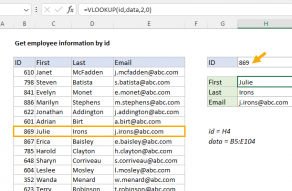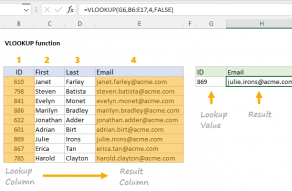Explanation
In this example, we have a table of employee locations like this on Sheet2:

On Sheet1, we retrieve the building location for each team member using this formula:
=VLOOKUP(B5,Sheet2!$B$5:$C$104,2,0)
The lookup value is the employee ID, from cell B5.
For the table array, we use the range $B$5:$C$104 qualified with a sheet name, and locked as an absolute reference, so that the range does not change as the formula is copied down:
Sheet2!$B$5:$C$104 // includes sheet name
This is the only difference from a normal VLOOKUP formula – the sheet name simply tells VLOOKUP where to find the lookup table range, B5:C104.
Finally, column number is 2, since the building names appear in the second column, and VLOOKUP is set to exact match mode by including zero (0) as the last argument. This ensures that we get the correct building for each team member and a #N/A error if for some reason the id is not found in the location table.



















